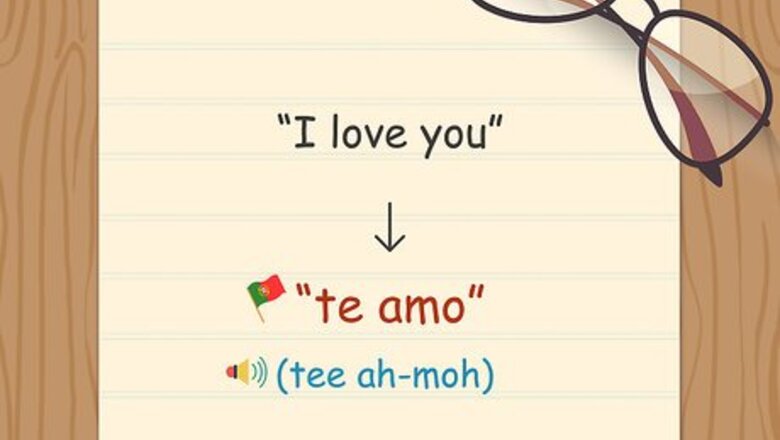
views
X
Research source
If one of those people happens to be someone you love, tell them eu te amo (yoh tee ah-moh) to say "I love you" in Portuguese.[2]
X
Expert Source
Israel Vieira Pereira, PhDPhD Student in Text & Discourse, Unisul University
Expert Interview. 16 August 2019.
This phrase can also be shortened to te amo. Beyond that, there are many ways to express your love and devotion in the Portuguese language.[3]
X
Research source
Expressing Your Love

Use te amo (tee ah-moh) to say "I love you." This simple way to say "I love you" is more common in Brazil than in Portugal. You can also say eu amo você (yoh ah-moh voh-say), which means the exact same thing. If someone says one of these phrases to you and you want to let them know that their affections are returned, you can say eu também amo você (yoh tahm-bee mah-moh voh-say), which means "I love you too." In European Portuguese, you would say amo-te instead of te amo.Tip: As with their English translation, these phrases are not exclusively romantic. You would also say them to express your love to friends or family members.

Say eu adoro você (yoh ah-dohr-oh voh-say) for "I adore you." As in English, expressing adoration for someone is similar to telling them you love them. This phrase is Brazilian Portuguese. In European Portuguese, you would say adoro-te (ah-dohr-oh tee). Eu tenho carinho por você is a similar phrase that means "I have affection for you."

Include the verb apaixonar (ah-pay-show-nahr) if you're falling in love. There is a specific verb in Portuguese for falling in love. The word apaixonar describes both the action and the feeling of falling in love with someone. If you want to tell your significant other that you're falling in love with them, you would say estou apaixonado por você (ish-toh ah-pay-shoh-nah-doh pour voh-say). You can also use this verb to tell other people that you are in love. If you are a man, you would say estou apaixonado (ehs-toh ah-pay-show-nah-doh). If you are a woman, you would say estou apaixonada (ehstoh ah-pay-show-nah-dah). For feelings that are even deeper, try estou perdidamente apaixonado por você, which means "I am head over heels in love with you."
Being Romantic in a Relationship
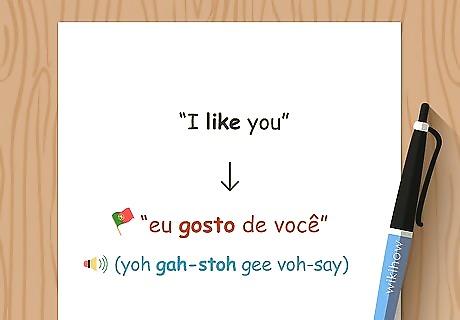
Try eu gosto de você to let someone know if you like them a lot. If you've just met someone, you may not be ready to say "I love you" yet, but you still want to let them know that you're starting to have romantic feelings for them. Eu gosto de você (yoh gah-stoh gee voh-say) means "I like you," and is a good way to express your feelings without going over the top. You can also say eu gosto muito de você, which means "I like you a lot."
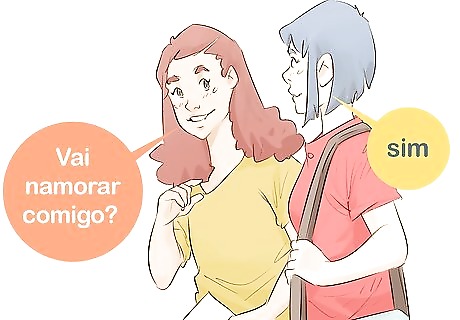
Use the verb namorar if you want to make your romance official. Maybe you're not quite to the point of saying "I love you," but you definitely want to officially start dating. Simply ask Vai namorar comigo? (veye nah-mohr-ah coh-mee-goh) This question means "Will you go out with me?" If your romantic interest says sim (meaning "yes"), you are officially a couple.Variation: The verb ficar is used to describe a more casual dating situation. Ficar com describes a situation where you are dating exclusively, while ficar compriso indicates you are seeing each other, but have no commitment. If you say Quero ficar com você you are also saying you want to date the person, but in a more casual way.

Call your loved one by an affectionate pet name. The words querido (kehr-ree-doh), docinho (doh-seen-yoh), and amorzinho(ah-mohr-zeen-yo) are common pet names in Portuguese. Querido is similar to saying "sweetheart" or "dear" in English. Docinho means "little sweet" and is similar to saying "cutie" in English. Amorzinho means "little love." Change the endings of the words if your significant other is female. In that case, you would say querida (kehr-ree-dah), docinha (doh-seen-yah), or amorzinha (ah-mohr-seen-yah).
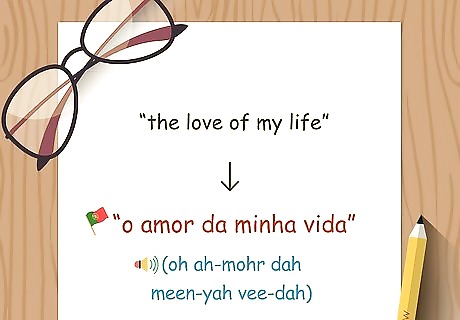
Use the phrase o amor da minha vida as a pet name. This phrase literally means "the love of my life." It is frequently used as a pet name in Brazilian Portuguese, particularly in long-term relationships. Pronounce this phrase oh ah-mohr dah meen-yah vee-dah.

Try você me completa (voh-say mee cohm-pleh-tah) in a serious romantic relationship. This phrase means "you make me feel complete." It can be incredibly charming when said to your significant other, particularly if you are in a long-term committed relationship and have started to think about the person as your other half. You might also try você é tudo pra mim(voh-say eh too-doh prah meem), which means "you are everything to me."
Flirting in Portuguese
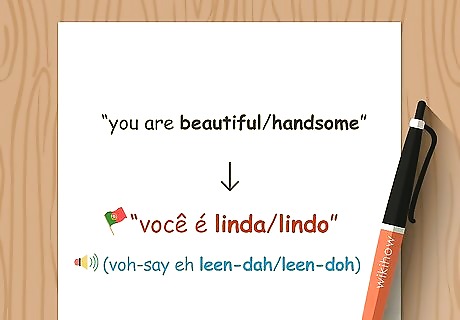
Pay your romantic interest a flirtatious compliment. Paying compliments is a way to show your affection for someone. If the person you're interested in speaks Portuguese, you can charm them with a compliment in their native language. If your romantic interest is a woman, you might say você é linda (voh-say eh leen-dah), which means "you are beautiful." For a man, you would say você é lindo (voh-say eh leen-dah), which is similar to saying "you are handsome." You might also say tens um sorriso lindo (tehns uhm sohr-ree-soh leen-doh), which means "you have a beautiful smile." Use linda if your romantic interest is a woman. If the person makes a joke, you might say és fixe (ehs fee-shee), which means "you're so funny."Variation: In Brazilian Portuguese, you can also tell your romantic interest they are gostoso (if they are a man) or gostosa (if they are a woman). This word literally means "delicious," but is used in slang as a flirtatious compliment, similar to telling someone they are hot or sexy in English.

Thank the person for spending time with you. The word obrigado (oh-bree-gah-doh) means "thank you" in Portuguese. At the end of a date, be sure to thank your romantic interest and let them know you had a good time. For example, you might say obrigado por esta agradável conversa (oh-bree-gah-doh pohr ehs-tah ah-grah-dah-vehl cohn-vehr-sah), which means "thanks for a great conversation." You might also say gostei muito de estar contigo esta noite (goh-stay moo-ee-toh deh ehs-tahr cohn-tee-goh ehs-tah no-eet), which means "I had a great time tonight."
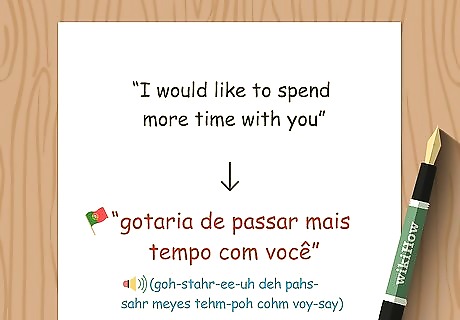
Find out if you can spend more time with the person you like. If you've decided that you really like someone, you probably want to see them again. You might say gotaria de passar mais tempo com você (goh-stahr-ee-uh deh pahs-sahr meyes tehm-poh cohm voy-say), which means "I would like to spend more time with you." You could also get more specific. For example, you might say gostaria de levá-lo para jantar (use levá-la if you're talking to a woman), which means "I would like to take you out for dinner."

Say eu te quero (yoh tee kehr-roh) to express your desire. The phrase eu te quero means "I want you." This phrase would typically be used in a more romantic or sexual context. You might also try eu te desejo, which means "I desire you." If you're looking for a phrase that's more romantic and loving, rather than sexual, you might try eu preciso de você, which means "I need you."

















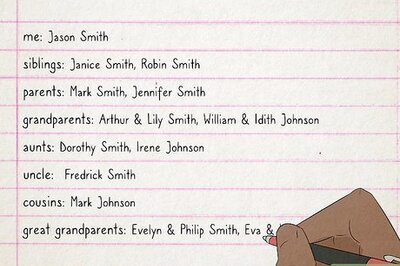

Comments
0 comment